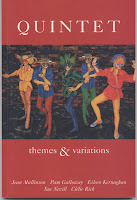
Bruce Sterling coined the term “slipstream” back in 1989, when he wrote in SF Eye, “…this is the kind of writing that simply makes you feel very strange…” Wikipedia goes on to say that “the common unifying factor of these pieces of literature is some degree of the surreal, the not-entirely-real, or the markedly unreal”. Defying categorization, slipstream writing may contain elements of fantasy, horror or science fiction, but it takes a mainstream approach to its material. It deals with universal concerns and universal images, paying close attention to craft and technique as well as to theme. Slipstream literature draws its inspiration from many sources: scientific concepts, speculation about the future, folk and fairy tales, the supernatural, dreams and visions. Its history extends from Beowulf, the Epic of Gilgamesh and Homer’s Odyssey, through Coleridge and Poe, to twentieth century Canadian writers like Gwendolyn MacEwen and Christopher Dewdney.
 Discover more about slipstream poetry:
Discover more about slipstream poetry: The Magazine of Speculative Poetry, PO Box 564, Beloit WI 53512. Founded in 1984, The Magazine of Speculative Poetry has been publishing the best speculative, science fiction, fantasy and horror poetry by Michael Bishop, Brian Aldiss, Jane Yolen, Robert Frazier, Bruce Boston and many others. A subscription of four issues is $19. A sample issue is $5.00.
Science Fiction Poetry Association (publishes a newsletter Star*Line)
Contemporary Science Fiction, Fantasy and Horror Poetry: A Resource Guide and Biographical Directory Scott E. Green
(Anthology) The Stars As Seen from this Particular Angle of Night, edited by Sandra Kasturi.
Recent collections by Canadian poets
The Animal Bridegroom by Sandra Kasturi
Quintet: themes and variations, by Clélie Rich, Jean Mallinson et al
Tales From the Holograph Woods by Eileen Kernaghan

